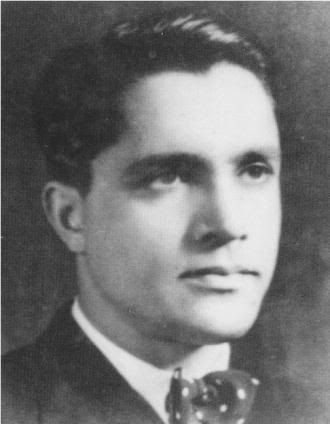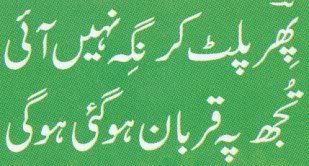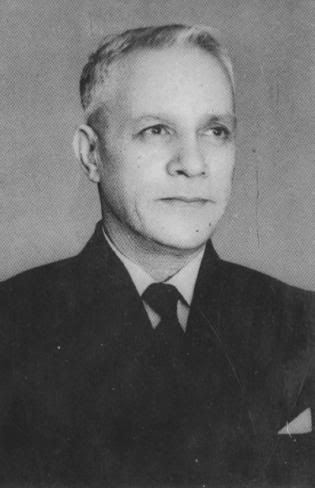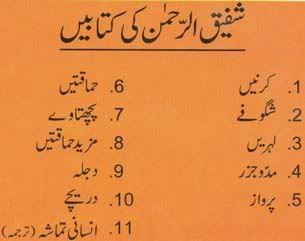Dr. Rauf Parekh
 Mushtaq Ahmed Yousufi, one of the most celebrated humorists of the Urdu language, said in an interview early in his literary career that he had decided to quit writing humour. Reason? He thought it was useless to write humour if one could not write it the way Shafeeq-ur-Rahman did. (Though, luckily enough, Yousufi Sahib later decided that he could write humour the way he himself did.)
Mushtaq Ahmed Yousufi, one of the most celebrated humorists of the Urdu language, said in an interview early in his literary career that he had decided to quit writing humour. Reason? He thought it was useless to write humour if one could not write it the way Shafeeq-ur-Rahman did. (Though, luckily enough, Yousufi Sahib later decided that he could write humour the way he himself did.)
Such was the influence of Shafeeq-ur-Rahman, a humorist who ruled the world of Urdu humour for about 60 years, and is still doing so.
 Shafeeq-ur-Rahman began writing and established himself in the pre-independence era like his contemporaries, such as Ibrahim Jalees, K.L. Kapoor, Krishan Chandr, Shaukat Thanvi and Rasheed Ahmed Siddiqi.
Shafeeq-ur-Rahman began writing and established himself in the pre-independence era like his contemporaries, such as Ibrahim Jalees, K.L. Kapoor, Krishan Chandr, Shaukat Thanvi and Rasheed Ahmed Siddiqi.
His first book ‘Kirnen’ (1942) was a collection of quasi-romantic and quasi-humorous short stories. His early stories did not show any signs of a great humorist. But in his second book, ‘Shagoofe’ (1943), romanticism gave way to humour and it was his later books, ‘Lehren’ (1944) and ‘Parwaz’ (1945), which established him as a pure humorist. ‘Himaqaten’ (1947) and ‘Mazeed Himaqaten’ (1948) earned him more accolades but the flow of his books shrank to a trickle of articles and then for almost 25 years he wrote nothing.
Zameer Jafri, in one of his columns titled ‘Kuchh na likhne ki silver jubilee’, ‘commemorated’ in his peculiar style Shafeeq’s literary hibernation.
 Some believe that for writers it is a must to keep on writing or run the risk of being forgotten and that the adage ‘publish or perish’ is not true of publishers alone, but of writers as well. (In my personal opinion, most of the writers of our times ‘publish and perish’.)
Some believe that for writers it is a must to keep on writing or run the risk of being forgotten and that the adage ‘publish or perish’ is not true of publishers alone, but of writers as well. (In my personal opinion, most of the writers of our times ‘publish and perish’.)
Strangely enough, despite having not written for such a long time, Shafeeq-ur-Rahman did not fade out and new editions of his books were published every few years. The copies of his books that I preserve like a treasure were published mostly in the early 1970s.
So, what are the factors that have kept him very much ‘in’ for such a long time? First, his humour has such a vigour and freshness that it has not wilted even today. Some of his essays in his early books are timeless. His wit and repartee put him way ahead of some of his contemporaries who, for example Shaukat Thanvi, depended more on playfulness or situational comedy.
Azeem Baig Chughtai (though hardly his contemporary, as he died in 1941), like Shaukat Thanvi, relished pranks and his humour consists largely of cheery boisterousness.
Though Shafeeq Sahib’s humour is not shy of practical jokes, he uses it sparingly and his playfulness stops just in time to save the humour from becoming tragedy, which sometimes is the case with Chughtai. Secondly, Shafeeq is the master of parody.
Hardly any humorist in Urdu can match his satire and bubbling wit when it comes to parodies. His five parodies — ‘Qissa-i-chahaar dervesh’, ‘Qissa-i-Hatim Tai bai tasweer’, ‘Qissa Professor Ali Baba ka’, ‘Tuzk-i-Nadri urf Siyahat nama-i-Hind’ and ‘Safar nama Jahazbad Sindhi ka’ — are fine satires on our history and culture.
For instance, in his ‘Tuzk-i-Nadri’, probably the most successful of all parodies in Urdu, he not only mocks the kings and their ‘tuzks’ (memoirs), but our political system is also his target when he writes (in the words of Nadir Shah) that:
‘In those days Delhi was in the grip of election fever. Ulloo Shanaas submitted that I had become so popular in Delhi that I could win election from any constituency, no matter on whose ticket I contest it…Out of my seven opponents, two withdrew when they were presented with large amounts of cash, the third was coerced into withdrawal, the fourth had to be made an ambassador to a country, two turned out to be a bit too obstinate and one of them had to be beaten black and blue and the other died in mysterious circumstances. When polling began, the entire population of the city was invited for a feast and presented with money and valuables. And if there happened to be any impudent voter who did not admit to my popularity, he was made to accept it with the help of a stick.’ (Mazeed himaqaten, p37).
Another factor that contributed a lot to Shafeeq Sahib’s public acclaim was his popularity among the adolescent. The main character in most of his humorous short stories is a young and witty college boy who is fond of cricket and movies.
Also, Shafeeq often portrays infatuations. This gives the youth a vicarious feeling. And his characters appear kind of flirtatious, too. His most famous character, Rufi alias Shaitaan, once quips:
‘Sonny! Don’t be sulky if you miss a bus or a girl, another one will be just round the corner.’ (Himaqaten, p121).
Then he often philosophises about joys and sorrows, sweeping the young readers with the bouts of optimism and pessimism, giving semi-philosophical, semi-romantic explanations to the queries that haunt the youth.
In addition, his many essays are nothing but a collection of jokes and the essay itself is only the thread that binds them together. His characters, novel and funny, such as Rufi or Shaitaan, Maqsood Ghora, Hukoomat Aapa and Buddy, make reading joyful.
All this put together is enough to hook young readers. I don’t know exactly which way the wind is blowing these days, but in my late teens and early twenties, I had read each and every book by Shafeeq-ur-Rahman many times over.
 Shafeeq-ur-Rahman was born on Nov 9, 1920, in a small town near Rohtak. He was educated at Bahawalpur, as described by Muhammad Khalid Akhter, Shafeeq’s classmate at Sadiq Dean High School and a humorist in his own right.
Shafeeq-ur-Rahman was born on Nov 9, 1920, in a small town near Rohtak. He was educated at Bahawalpur, as described by Muhammad Khalid Akhter, Shafeeq’s classmate at Sadiq Dean High School and a humorist in his own right.
Shafeeq-ur-Rahman did his MBBS in 1942 from Lahore’s King Edward Medical College. Having joined the Indian Medical Service as a lieutenant, Shafeeq-ur-Rahman was posted, according to Khalid Akhter, at different war fronts during the Second World War.
He then joined Edinburgh University and London University to further his education. It certainly broadened his perspective. But both Shafeeq-ur-Rahman and Khalid Akhter were already immersed in English literature and it had definitely influenced their writings.
On Shafeeq’s style one can trace the influence of western humorists such as Stephen Leacock and Mark Twain, but he is among those writers of Urdu who are well-grounded in their own literature and culture and have a peculiar style of their own.
After independence, Shafeeq-ur-Rahman held high positions in the Pakistan Army and Navy and in December 1980 was made chairman of the Pakistan Academy of Letters, a post he held till December 1986. His other books include ‘Madd-o-jazar’ (1946), ‘Pachhtawe’ (1948), ‘Dajla’ (1980) and ‘Dareeche’ (1989).
The irreplaceable and inimitable Shafeeq-ur-Rahman died in Rawalpindi on March 19, 2000.
Note: This article also appeared in the Daily Dawn of Tuesday, 24 Mar, 2009. Posted here with author’s permission.
Chronology of Shafiq-ur-Rehman’s Books:
1. kirnen, 1942
2. shagoofay, 1943
3. lehren, 1944
4. parwaaz, 1945
5. madd-o-jazar, 1946
6. hamaqaten, 1947
7. mazeed hamaqaten, 1948
8. pachtaawe, 1948
9. dajla, 1980
10. dareeche, 1989
11. insaani tamasha
ATP’s Other Post on Shafiq-ur-Rehman: billi – an excerpt from lehreN.



















































A website http://www.urdupoint.com has uploaded Shafeeq Sahib’s “Lehren”. I am enjoying reading it there.
Shakil Saheb, the ‘pulaao’ with 4 p.m. tea comment made me smile :) I recently reviewed hamaqaten for probably the hundredth time and the pulaao at high tea episode is very fresh in my mind. Also the line of Shafiq-ur-Rehman in the same chapter where dieting person tastes food by saying ‘dekhoon zara.. kaheeN ye billi to nahiN thi’ :)
i like shafiqur rahman very much. i found hamaqaten in my house in 60’s when i was a boy and read it without knowing name of the book or of writer because first few pages were torn away. later i could read most of his books with relish and own some dearly.my only son is nicknamed roofi, no one knows his real name. my wife too has read all and smiles when i catch her eating ‘pulao’ with 4 pm tea, while dieting, and i call her hukomat aapa.
A more detailed translation from the web of Neeli Jheel’s ending.
An Excerpt from “Neeli Jheel” in Himaaqatein
“I still remember that day when Roofi and I were sitting on the lakeside grass. It had rained the night before but the morning was clear. There was chill in the air. Clouds were afloat up above us. Crystal blue lake was covered with light fog. There was certain freshness, certain crispness in the air. It felt as if everything has just been created!
We read stories, chatted and played around. We watched the birds fly and the butterflies dance. Our fishing rods were in the water. We waited all day to catch some fish. We came fully prepared to cook them. By the day’s end, Rustam came to pick us up. He too, was dazed by the scenic display of nature. He sat down by us and started telling us strange things. We never liked it when he talked in that manner.
He was talking very somberly! “What if this life would pass away in self-forgetfulness and self-delusion? What if it would pass away smiling—but it does not happen this way. No matter how hard you try, it still never happens. One has to wake up from dreams.” He started telling us, “Boys! When you grow up you will feel sorrow and as you gain experience and your thoughts mature, this feeling of sorrow will increase. Your dreams will fade away and you will not be able to deceive yourselves. When you grow up, you will discover that life is very difficult. One wants status and luxury to live—, and that requires money. To get that you have to compete and in that competition, you have to lie, cheat and betray. No one cares about anybody here. Friendships, love and affection in this world—are all based on some self-serving purpose. Amidst tender conversations, smiles and kindnesses lies some latent self-serving intention. So much so that people remember God only when they need Him and—when He does not respond accordingly, they become atheists and deny His existence. You will never be able to keep everyone in this world happy. If you were a simple person, people will laugh at you; they will poke fun at you. If you were to be an intellectual and wise then they will envy you. If you were to stay aloof then you would be considered cunning and a grouch. If you were sociable then you would be considered an opportunist. If you were to spend your wealth wisely then you would be considered a low-life and a miser and if you were generous then you would be considered a spendthrift and a fool! Throughout your life no one will ever understand you nor will anyone attempt to do so. You will always be alone until that day will come when you will be departing this world. At that time, you will be perplexed: What was all that! What was the need for that! How meaningless and futile it all was!”
The Sun was setting. It felt as if the other bank of the lake suddenly lit up! Over there, fog and cloud had created such a colorful palace that we were flabbergasted. Beautiful and delicate arches, colorful watch towers and minarets, serpentine stairways and far-reaching castle walls.
We pointed this out to Rustam, “Who says that the other bank is like this one—just look!”
Everything then turned deep blue, the sky, the lake, clouds, the air and the other bank. It felt as if the whole universe turned blue and that beautiful palace made of clouds became a marble one and was covered with moonlight.
Years have passed since then and by now I should have become wise and mature but unfortunately, the time did not bring about any change in me. Whenever faced with life’s harshness and ugly realities crush my fine and delicate dreams, I seek refuge on the bank of a similar blue lake. As long as the eye could see, there is a whole succession of such lakes in my life where one ends, the other begins—where the boundaries of reality touch the boundaries of imagination—there is a mysterious piece of land—similarly alluring and beautiful—the other bank”
Shafiq Ur Rehman is one of my Favorite Authors, his Writing style which was unique … i read mostly all his Books, Humor His beat… May God bless his soul.
………………